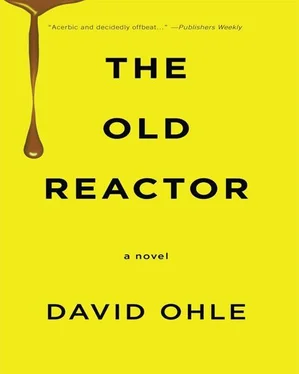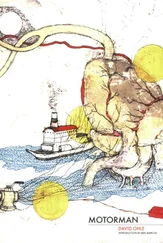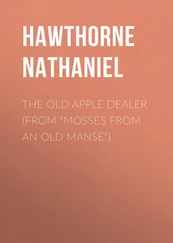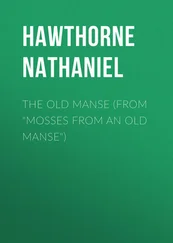David Ohle - The Old Reactor
Здесь есть возможность читать онлайн «David Ohle - The Old Reactor» весь текст электронной книги совершенно бесплатно (целиком полную версию без сокращений). В некоторых случаях можно слушать аудио, скачать через торрент в формате fb2 и присутствует краткое содержание. Год выпуска: 2014, Издательство: Dzanc Books, Жанр: Современная проза, на английском языке. Описание произведения, (предисловие) а так же отзывы посетителей доступны на портале библиотеки ЛибКат.
- Название:The Old Reactor
- Автор:
- Издательство:Dzanc Books
- Жанр:
- Год:2014
- ISBN:нет данных
- Рейтинг книги:4 / 5. Голосов: 1
-
Избранное:Добавить в избранное
- Отзывы:
-
Ваша оценка:
- 80
- 1
- 2
- 3
- 4
- 5
The Old Reactor: краткое содержание, описание и аннотация
Предлагаем к чтению аннотацию, описание, краткое содержание или предисловие (зависит от того, что написал сам автор книги «The Old Reactor»). Если вы не нашли необходимую информацию о книге — напишите в комментариях, мы постараемся отыскать её.
The Old Reactor — читать онлайн бесплатно полную книгу (весь текст) целиком
Ниже представлен текст книги, разбитый по страницам. Система сохранения места последней прочитанной страницы, позволяет с удобством читать онлайн бесплатно книгу «The Old Reactor», без необходимости каждый раз заново искать на чём Вы остановились. Поставьте закладку, и сможете в любой момент перейти на страницу, на которой закончили чтение.
Интервал:
Закладка:
“All right. You can stay. I’ll fix you a place on the floor near the stove. There’re blankets in the closet.”
“I like you. You’re nice.”
“Well, I try to accommodate.”
“What does that mean?”
“It means being nice.”
The waitress brought the breakfasts. “Here’s your order.” She looked Moldenke in the eye. “You look like you haven’t heard. Have you heard?”
“I haven’t heard anything,” Moldenke said.
“They liberated Bunkerville. It happened last night. They just said it on the radio. We’ll all be sent back now. That’s what the radio says. They’re thinking the freeborn might have to stay. Nobody’s sure.”
Salmonella was perplexed. Her eyebrows arched and she stuck out her tongue and made a hissing sound.
“She was freeborn,” Moldenke said. “Doesn’t understand what liberation is. Maybe that’s why they want them to stay.”
The waitress tapped a pencil against the side of her head. “I don’t think I do either, tell you the truth.”
Salmonella had a bite of scrapple. “I’m not staying.”
“Like I said,” the waitress said, “it was only the radio. It probably isn’t true. You can probably go if you want to.”
Moldenke had a bite of his scrapple, hot enough to burn his tongue. He spit it out to let it cool.
“Will they send you back?” Salmonella asked.
“I don’t know. How would I know?”
“If they do, I’m going with you. You can’t leave me here.”
When Moldenke’s scrapple had cooled, he ate it hungrily. “I’ll probably regret this later.”
“Did you hear me? I said I was going with you.”
“It’s probably a false alarm. Somebody started a rumor. I’m not going to get excited.”
Patrons were getting up and leaving in haste.
Salmonella pointed her fork at Moldenke. “Look at them. We should go.”
Moldenke polished off the last of his scrapple and stood up. “We have to get back to the Tunney and take care of those two…the things we discussed.”
Salmonella smiled, showing teeth greened by the soda. “I’m ready.”
They returned to the Tunney to find several of the roomers walking out with their few things. “Hell, man. We’re going back to Bunkerville. What about you? There’s a big boat leaving from the Point Blast wharf tonight.”
“I haven’t gotten any official kind of notice,” Moldenke said. “I have responsibilities here.”
“There’s no notice. You just go. We’re getting rotated. Don’t you get it? The radio is saying it’s time to head for the Point.”
The men rushed toward the car stop reaching for their pass cards.
Salmonella held Moldenke’s hand. “I’m going with you. Let’s go. Let’s go now.”
Moldenke worried. “We can’t leave the bodies.”
Salmonella shrugged. “Why? We need to get to the Point. What if we miss the boat?”
“Where is Udo’s motor?”
“It must be parked near the Heeney. We can find it. I know where he hides the key. We don’t have to worry about the bodies.”
Moldenke thought it over for a moment. “It does seem nicer where they are than anywhere else we could put them, doesn’t it?”
“It’s a beautiful place,” Salmonella said. “Let’s go.” She tugged on Moldenke’s finger. “Come on, we’re going to Bunkerville. Me and you. We’ll get along good.”
“I have nothing to pack,” he said. “These are my only clothes.”
“All I own is in this bag,” Salmonella said. “We have to find the motor.” She led Moldenke out of the Tunney and past the ruins of the Heeney. By then the site was abandoned, the embers out and the bodies taken away by family or friends, or those willing to help out of boredom.
Around the corner from the Heeney, Udo’s motor was parked under a flickering street lamp, its roof coated with ash from the fire.
“There it is,” Salmonella said excitedly. “The key is hidden in the well of the fifth wheel.”
Moldenke sank into a funk. He was leaving behind a nice apartment with a commode and a kitchen. He was leaving behind the lofty feeling of being a concierge with the run of a two-story rooming house. And what would he find when he returned to the House on Esplanade? A shambles? With jellyheads living there?”
The golfer, Brainerd Franklin, has died. A lover of the practical joke, he had asked to be buried in a lace nightgown, seated comfortably in a reclining chair, with an album of Misti Gaynor photos in his lap. “Tell them to hire a backhoe if they must,” he said to his nurse shortly before passing on, “move mud, get me in deep. Leave air space within so that beetles and worms have free passage.”
The nurse, who says she knew the end was near, told reporters that in his last weeks Franklin had been spitting up whatever he swallowed. His house gown was a sour mess and he had bouts of quivering and loose bowels. He appeared discombobulated, petty and annoyed, clumsy and skittish. In a fit of self-mutilation, he scissored off both ear valves and ate them.
The nurse said she knew the end was near when he took to his bed and refused all food and drink for five days. She remained beside him in the final moments. His last words, she recalls, were “Tell them I’ll be back for supper.” After uttering them, there was a groan, a gasp for breath, and the great golfer was gone.
When the cortege arrived at the jellyhead cemetery, the excavation was ready, rimmed with green velvet and artificial grass, seeming to invite Franklin’s body, which could be seen atop a motor that streamed black bunting from the rear. There were hundreds in attendance, free people and jellyheads alike.
Udo’s motor had been parked for weeks. Moldenke feared it wouldn’t start. He checked the level of heavy water in the tank and located the key in a small magnetic box hidden under the well of the fifth wheel. Salmonella rushed in when he unlocked the front door. There were spider webs in all the ceiling and door-frame corners and mice rustling in a kitchen drawer. Salmonella struck a match, lit a lantern, and the cockroaches scattered.
Moldenke sat in the driver’s seat, set the finder for Point Blast, and goosed the starter. The first several attempts failed to warm the water enough to send it flowing through the system. Until that happened, the motor could not be driven.
“It isn’t going to start,” Moldenke said.
“Pump that little red rod in and out a few times. That’s what my father used to do. He told me it was the hot rod.”
Moldenke located the red-handled rod and engaged it over and over until it was warm to the touch without success. “I’m about to give up,” he said.
Salmonella stomped her foot on the wooden floor. “Keep trying. It takes a while.”
Moldenke did keep trying and in a few minutes he could hear water gushing through the main tube.
“Goody, goody,” Salmonella cheered. “I’m going to dust out my nook and go to sleep. Wake me when we get to the Point.”
“All right.”
Moldenke geared up the motor and drove down Arden Boulevard, mostly past darkened buildings. Even Saposcat’s and the public privy were closed. Almost everyone had been reprieved and was leaving. Yet when he turned onto Old Reactor Road he could see the lights of the Quarter burning brightly. No one was leaving the gates. They knew that all those empty buildings on the west side would soon fill with new arrivals and customers would return. Now that Bunkerville was liberated, the dispossessed would be coming to Altobello in droves. The older Quarter dwellers had probably seen the cycle repeat more than once in their lifetimes and had come to accept it as the way things went. It was something to be counted on if not understood, like the tides.
Читать дальшеИнтервал:
Закладка:
Похожие книги на «The Old Reactor»
Представляем Вашему вниманию похожие книги на «The Old Reactor» списком для выбора. Мы отобрали схожую по названию и смыслу литературу в надежде предоставить читателям больше вариантов отыскать новые, интересные, ещё непрочитанные произведения.
Обсуждение, отзывы о книге «The Old Reactor» и просто собственные мнения читателей. Оставьте ваши комментарии, напишите, что Вы думаете о произведении, его смысле или главных героях. Укажите что конкретно понравилось, а что нет, и почему Вы так считаете.












